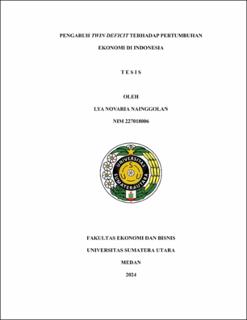| dc.contributor.advisor | Sembiring, Sya'ad Afifuddin | |
| dc.contributor.advisor | Paidi | |
| dc.contributor.author | Nainggolan, Lya Novaria | |
| dc.date.accessioned | 2025-01-08T02:42:53Z | |
| dc.date.available | 2025-01-08T02:42:53Z | |
| dc.date.issued | 2024 | |
| dc.identifier.uri | https://repositori.usu.ac.id/handle/123456789/99920 | |
| dc.description.abstract | This study aims to determine the Effect of Twin Deficit on Economic Growth in Indonesia.
This study uses a data analysis model with a stationarity test, determination of Lag Length, granger causality test and VAR estimation consisting of Impulse Response Function (IRF) and Forecast Error Variance Decomposition (FEVD).
The results of this study indicate that EG has a causal effect on BD, while no significant causal relationship was found from BD to EG. Meanwhile, based on the results of the VAR estimation, the budget deficit variable has a positive and significant coefficient on economic growth in the short term, indicating that an increase in the budget deficit can provide a temporary boost to economic growth.
The IRF analysis shows that shocks to the budget deficit cause a positive response to economic growth. | en_US |
| dc.language.iso | id | en_US |
| dc.publisher | Universitas Sumatera Utara | en_US |
| dc.subject | Budget Deficit | en_US |
| dc.subject | Current Account Deficit | en_US |
| dc.subject | Economic Growth | en_US |
| dc.subject | Twin Deficit | en_US |
| dc.title | Pengaruh Twin Deficit Terhadap Pertumbuhan Ekonomi di Indonesia | en_US |
| dc.title.alternative | The Effect of Twin Deficit on Economic Growth in Indonesia | en_US |
| dc.type | Thesis | en_US |
| dc.identifier.nim | NIM227018006 | |
| dc.identifier.nidn | NIDN0003105505 | |
| dc.identifier.nidn | NIDN0020097502 | |
| dc.identifier.kodeprodi | KODEPRODI60201#Ekonomi Pembangunan | |
| dc.description.pages | 114 Pages | en_US |
| dc.description.type | Tesis Magister | en_US |
| dc.subject.sdgs | SDGs 8. Decent Work And Economic Growth | en_US |


